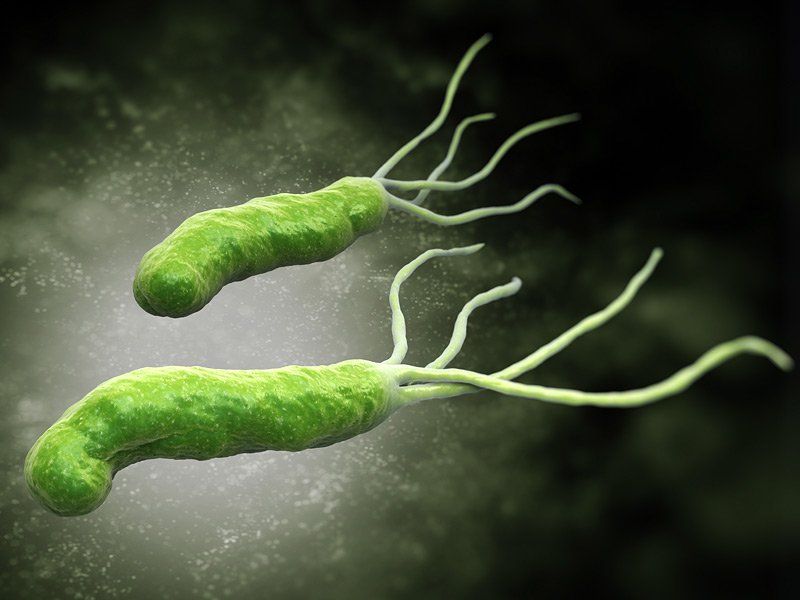 I am seeing more of this in clinic as of late, particularly in cases where multiple runs of antibiotics have failed and the individuals are having issues with wasting, increased GERD, and severe difficulty with nausea, slow digestion and gastric motility. When I was in school, I did quite a bit of extensive research on H-pylori and it's ties to gastrointestinal carcinomas, as it is the first confirmed carcinogenic bacterium (meaning, a bacteria that has direct ties to some gastrointestinal cancers). The following is a copy of my newest client handout, and further down you will find a copy of my research paper as well, if you are so inclined to read 45 pages of commentary about this amazing little bacterium. Helicobacter pylori is the first formally recognized bacterial carcinogen (meaning it is a bacterium that is recognized to play a part in some cancers) and is one of the most successful human pathogens, as over half of the world's population is colonized with this gram-negative bacterium. Unless treated, colonization usually persists lifelong. H. pylori infection represents a key factor in the causative factors of many gastrointestinal diseases, ranging from chronic gastritis to peptic ulcers, and some gastric cancers. It is not to say however, just because you have an h-pylori infection that there is reason to panic. This bacterium is one that both standard western medicine, and natural healers have many options available to the individual. Unlike other types of bacterium, H-pylori are adapted to live within the harsh, acidic environment of the stomach. Whereas in some cases bacterium may become eradicated by the presence of our gastric juices and hydrochloric acid within our stomach, h-pylori will instead thrive within the human GIT. It is a very opportunistic bacterium and can use specific chemical modifiers in order to penetrate the lining of the stomach where they are protected by the mucous lining in the gut. Additionally, the bacterium can interfere/communicate with the human immune system, causing it in essence to turn a ‘blind eye’ and thus it may pro-create and multiply freely within its host’s gastro-intestinal tract. Causes: Despite advances in modern medicine, the exact method of how H-pylori infections spread is generally unknown. The bacterium has existed with mankind over many thousands of years and the infections are thought to spread from oral interaction. Additionally, it may be transferred when an individual is in contact with feces. This can occur when an individual does not properly wash their hands, or if they are in contact with animal feces which interacts with mucosa such as hands going to mouth or eyes (currently theoretical). Lastly, it is believed that H-pylori can be spread via contact with contaminated food and water. It is good to know that although H. pylori has indeed been detecting in saliva, vomitus, gastric refluxate, and feces, there is currently no conclusive medical evidence for predominant transmission via any of these products. Currently the medical establishment has concluded that H. pylori is most likely contracted in childhood and from close family members who may also be silent carriers of the bacterium. In developing countries, the statistics for this are vastly different as hygiene levels and availability to clean food and water sources are often impacted. How does H-pylori impact the body? Some of the ways in which H. pylori impacts the body are the initiation of the body’s defensive inflammatory cycle, and conditions such as:
Additional diseases where H. Pylori interaction is suspected include Irritable bowel syndrome (IBS), Irritable bowel disease (IBD), Crohns, Colitis, and inflammatory diverticulosis. There is also evidence linking H. pylori to other conditions like iron-deficiency anemia and vitamin B12 deficiency. In studies there has been evidence that H. pylori has correlating factors not only with gastrointestinal diseases, but in fact it has shown correlating and contributing factors to all inflammatory disease. These include cardiovascular disease, neurological diseases, gynecological diseases, ophthalmology, skin, and oral mucosa diseases, diseases of the ears, nose, and throat, hematological diseases, hepatobiliary diseases, and issues with obesity. Symptoms and Complications of H-pylori: Most people with H. pylori infection will never have any signs or symptoms. It's not clear why this is, but some people may be born with more resistance to the harmful effects of H. pylori. When signs or symptoms do occur with H. pylori infection, they may include:
Some of the more common complications associated with H. pylori infection include:
Natural Suggestions for H-pylori Infection: Commonly Used Herbs: Echinacea - Boosts the immune system, changes the environment of the body in relation to the bacterium. This herb is a general tonic, immune modulator, immune stimulant, helps move lymph, antiseptic, anti-microbial, anti-bacterial, anti-parasitic, anti-inflammatory, detoxifier, bitter, and peripheral vasodilator. It is specific in its use for chronic infections of various types and can be used in cases of peptic ulcers, and general GIT infections. Cat’s Claw – A native to the Amazon basin, this herb is a powerful healer. Its traditional actions are: tonic, restorative, immune stimulant, antioxidant, anti-bacterial, anti-inflammatory, astringent, alterative, and can also be hypotensive. It strengthens the immune system and is a powerful agent against microbes and bacterium. Poke Root – This herb is considered a restricted herb, please see a clinical herbalist for proper dosage. For short term use, this herb is a powerful combatant against h-pylori. It is an immune-stimulant, anti-bacterial, anti-viral, anti-parasitic, anti-inflammatory, moves lymph, alterative, detoxifier, and bitter. Meadow Sweet – Often used in formulations for healing the GIT. It is astringent, antiseptic, analgesic, anti-inflammatory, antacid, carminative, digestive, liver tonic, and anti-ulcer in action. In the GIT it helps regulate gastric levels and pH. It protects and soothes the GIT mucosal lining and is specific in issues with nausea, heartburn, peptic ulcers, indigestion, diarrhea, and IBS which can be associated with H-pylori. Thyme – Common garden thyme is a very versatile herb. It is considered to be tonic, antioxidant, antiseptic, anti-microbial, anti-bacterial, anti-viral, anti-fungal, anti-parasitic, anti-inflammatory, astringent, digestive, and antispasmodic. In issues with the GIT, its astringent actions can help heal mucosal linings and it is specific in issues with gastritis and IBS. Plantain Leaf – Traditionally used in cases where mucosal membranes need healing. Plantain leaf is antiseptic, anti-microbial, anti-bacterial, anti-inflammatory, demulcent, refrigerant, alterative, blood tonic, and antacid in action. In the GIT it is a soothing agent and is often used specifically in issue with acidity and gastritis. Oregon Grape Root – This herb is rich in berberine and is tonic, antiseptic, anti-microbial, alterative, hepatic, and anti-bacterial. It is specific as a general blood cleanser with its actions upon the liver, and can be used for conditions of the GIT. Commonly Used Supplements: Multi-Vitamin – For the general function of all metabolic and cellular functions. This is an aggressive bacterium; the body needs every opportunity to heal. CoQ10 – Improves cellular oxygenation, protects cardiovascular health, and promotes proper circulation. Vitamin B Complex – Needed for proper digestion, metabolic function, and cellular repair from inflammation. Potassium – Increases cellular metabolism and aids in balancing blood pH. Vitamin A – Helps to protect the mucous membranes and to protect the body from the damages of the inflammatory cycle. Colostrum – Promotes accelerated healing of the GIT and boosts the immune system. Probiotic – Supports the re-establishment of gut health, improves healing and lowers inflammation. Dietary/Lifestyle Suggestions:
References:
6 Comments
3/24/2022 01:44:34 am
Excellent article! Your post is essential today. Thanks for sharing, by the way. If you are looking for coupon codes and deals just visit coupon plus deals dot com
Reply
Anni
2/19/2024 10:06:20 pm
Thank you! Could you be more precise in how to eradicate h.pylori naturally? Dosage, which supplements to choose etc.?
Reply
Anni
2/19/2024 10:08:40 pm
Sorry, found what I was looking for in the scribd material I guess :)
Reply
Anni
2/19/2024 10:20:07 pm
Sorry. I found the recipes on the file. Are these essences to be made in homeopathic Pharmacy?
Reply
Leave a Reply. |
Petra Sovcov is not a Medical Doctor (MD) nor a Naturopath (ND), she is a Clinical Herbal Therapist (CHT) and holds a Doctorate in Natural Medicine (DNM). The suggestions or recommendations made on this site are not meant to be a substitute for advice from your MD, or as a substitute for any prescriptions you may be taking. Suggestions followed will be the responsibility of the reader, and are stated with the intention of interest and education only. If you have a health issue, please see your primary care physician (MD) first and foremost. Categories
All
Archives
July 2024
|

 RSS Feed
RSS Feed